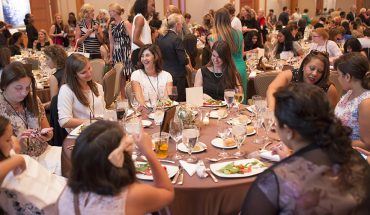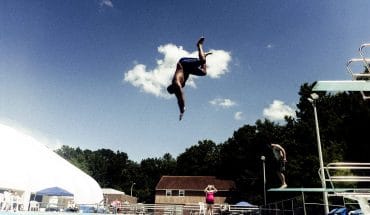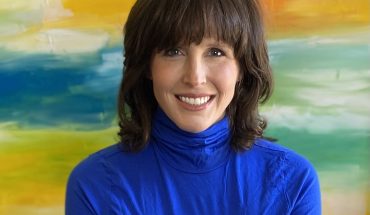by Andrew Kenney
photographs by Missy McLamb
Debbie Yow appears from her athletics director office at a bustling clip. She offers a hearty hello to her senior staffer and a visitor. This is the heart of Wolfpack territory, covered with jerseys, milestone photos, and an overwhelming amount of red. This morning, before anything else, the person who runs the place wants to show off its latest addition.
“Feel how heavy this is,” Yow says, hefting a bust of a wolf into the hands of Fred Demarest, an understated guy who handles media relations for the athletics department. Demarest appreciates the weight of the thing for a second.
“Guess how much it costs,” Yow says. Demarest guesses. The wolf, his boss reveals, cost a surprisingly low $50. It’s going to make a great staff gift, they agree.
It’s a disarming welcome. Yow, 65, is in the final decade of an ever-ascending career, and her sixth year at N.C. State. She was the first woman to lead an athletics department in the Atlantic Coast Conference, has coached at three universities – Kentucky, Oral Roberts, and Florida – and led departments at three others. When she swept into Raleigh, it was with a series of hires that transformed State’s athletics program.
Lately, she seems to have won the Wolfpack’s trust. Her coaches are winning games. The online bulletin-board critics are favorable. At N.C. State, where cheering often comes with lament, people seem awfully contented.
But while Yow’s influence is tangible, her work isn’t done. Her master plan for the renovation of her school’s athletics extends already through 2017. And before she retires in 2019, she’d like to obliterate the chip on N.C. State’s shoulder, once and for all.
Her path has prepared her. She has been a dropout and earned a doctorate, and she is tied to North Carolina by family and by death. Her sister was the late Kay Yow, a coaching icon who led the N.C. State women’s Wolfpack basketball team from 1975-2009 for 700 wins, brought home a gold medal for the U.S. women’s basketball team in 1988, and remains beloved statewide and across the wider world of college basketball.
Today, at her sister’s beloved State, Debbie Yow leads more than 250 employees and 550 student athletes on 23 varsity teams, playing and practicing at 15 facilities and fields.
Her circle has come nearly all the way around, from the basketball gymnasiums of her family’s hometown in Gibsonville, N.C., to cities and states beyond, and now back to Raleigh, a city with high expectations of Debbie Yow.
Early years
Kay was eight years older than Debbie – far enough ahead that she saw little of her teenage younger sister, except at basketball games. Kay was working as the girls’ coach for Allen Jay High School, and Debbie was the hot new jump shot on a rival team.
The younger sister expected an easy victory in their first face-off.
“I knew it wasn’t going to be an issue if it was one-on-one,” Yow says, eyes narrowing with the memory. She told her sister: “You can put your best person on me.”
So Kay used two of her best instead, winning games with a double-team defense. Each loss irritated Debbie so badly that she would go for months without talking to her sister.
Yow hated to be stifled, but competition was a Yow tradition. Their little sister, Susan, played the game too.
All three girls spent time dribbling in the Gibsonville High School gymnasium. Ask about their parents, and Yow will show you a picture of her mother as captain of an all-girls squad sponsored by one of the local mills. And she can still hear their father calling from the sidelines, where he would sit in his khakis and his work shoes.
“All the men in my family always expected the women to be athletes,” she says. “That’s just the way it was. They would expect that you would be in the homecoming court, and you also better start on the basketball team.”
Bringing it home
To understand Debbie Yow’s challenge, here in the twilight of her career, you have to understand N.C. State athletics.
State in its prime has been a spoiler and a wildcard. Its 1983 basketball team – the Cardiac Pack – put together a string of come-from-behind victories, and then an unlikely final dunk to snatch the championship from a steamrolling University of Houston squad.
There are few sights like a State crowd riding high on an underdog victory against its liberal-arts cousin, the University of North Carolina. It was Pack fans, in fact, who unearthed the first of the evidence that eventually would yield the recent UNC athletic-academic scandal.
This is a school that bleeds and seethes Wolfpack red. The Pack is perpetually ready for a big year, a big upset – and it’s perpetually waiting. For every white-knuckle victory there has been an embarrassing stumble, or three unwanted interventions by the basketball gods. It’s a special pain, so ineffable that most people just call it “N.C. State Sh*t.”
Yow’s task, then, is to temper and kindle those jet-fire bursts into a steady flame. She set straight to it when she was hired to replace 10-year director Lee Fowler, leaving little doubt about her intentions as she swept a series of nine new head coaches into place.
“The whole change of N.C. State athletics, I think, is … around her vision,” says Braden Holloway, a 2001 graduate and one of the first new coaches under Yow’s program.“The vision was not here when I was in school … There was no accountability. It was kind of our slogan: Everybody was fine with mediocrity.”
In Holloway’s first season leading the swimming and diving program, State finished in the conference’s top five for the first time since 2006. This year, Wolfpack aquatics won the conference for the first time in 23 years, and took an eighth-place national finish.
Meanwhile, the university’s athletics department as a whole has lifted steadily up the national rankings.
Yow’s metric of choice is the National Association of Collegiate Directors of Athletics Directors’ Cup. When she arrived, State sat at 89th in the cup rankings, which are based on schools’ athletic performances across 20 sports.
She set her sights on the top 25, alongside Duke and UNC – and her goal is already in sight. The school’s ranking has improved in four of Yow’s five years at State, peaking this year at No. 27 for Division 1. The change comes on the backs of both the marquee teams and the squads that don’t rake in huge revenues. Baseball, softball, men’s basketball, and both golf teams have posted significantly improved scores, among others. More visibly, Coach Mark Gottfried has led the men’s hoops team to the NCAA tournament in each of his first four years, breaking a five-year drought.

While head coach at Kentucky from 1976-80, Yow’s record was 79-40, including a 24-5 record in 1979-80, her final season in Lexington.
Creating a culture
Student-athletes, of course, are bound up by the rules of fate and statistics, perhaps more than the professionals. There’s only so much a coach can do – much less that coach’s boss – to guarantee victory in the face of countless improbabilities.
The one thing that Yow truly can influence is State’s culture – the organizational calculus that balances the simpler arithmetic of scores and salaries and grade-point averages.
“The people are the key,” she says. “Hiring the right coaches is probably the single most important thing I do. Hire the wrong coach, and now you’re in a quagmire.”
Yow knows this math well. She describes it simply, to the point of redundancy: “Establish the culture. Reinforce the culture. Act with integrity when the culture is threatened.”
But the real stuff of an effective “culture” – a concept that has long obsessed board rooms and locker rooms – isn’t so easy to capture.
It emerges in communication, mostly behind the scenes: It’s in Yow’s late-night voicemails to staff, and in the painstaking personal responses she drafts to fans’ complaints. Her touch is powerful.
“She runs on 220 volts, and some people run on 110,” says Chris Boyer, who runs external affairs and communications for Yow.
That engine revs the bottom line as well. Two important measures of an athletics department’s success are money and graduates. Under Yow’s leadership, the department’s revenues have grown from roughly $50 million to $70 million, nearly catching up with the University of North Carolina, the Triangle Business Journal reported.
“Everyone’s budget here is considerably better than it was five years ago,” Yow says. “They were starving.”
Apparel contracts and increased ticket sales, especially under Gottfried’s basketball program, have boosted the department. An improving economy likely has played its part too.
The school’s athletes, meanwhile, are graduating at record rates.
“It’s stay, stay, stay,” Yow says. “Work your way through it.”
Only 49 percent of the student-athlete cohort finished N.C. State in 2009, according to the federal graduation rate. That number climbed to a school record of 71 percent in 2014, reflecting national trends and surpassing the NCAA average.
Yow can claim some credit for that improvement. Just as coaches respect Yow’s experience in coaching, students empathize with her twisting, turning path toward education.
“It’s easy for me. I remember what it feels like not to have it,” she says of her quest to help athletes earn their degrees.
Yow dropped out of East Carolina University after two years, just as her sister’s star was rising. And she remembers the moment that put her back on track. She flashes back to a moment at the Sears in Burlington, N.C., where she worked after leaving ECU.
Then 20, Yow was organizing something – fishing gear, she thinks – when her supervisor shut her down.
“He came up to me and basically said, ‘What you’re doing is all wrong,’” she recalls. She knew her way would make more sales, so she tried to argue back – and then something clicked.
“I’m right, he’s wrong, I’m smarter than he is, and it doesn’t matter. He’s the supervisor. … It doesn’t matter. I have no authority.”
That low memory, along with her older sister’s guidance, would propel her toward Elon College (now Elon University), where she played basketball for Kay.
So began the climb.

Yow was the head coach at Oral Roberts from 1980-83 before returning to the Southeastern Conference at the University of Florida, her final coaching position.
Lasting legacy
Debbie Yow once made Kay a promise. She knew she shouldn’t have, but it couldn’t be helped.
The elder sister was terribly ill with breast cancer early in 2009, unable to coach any longer. She had been in the hospital often, but Debbie decided one particular week that she had to drive from Maryland, where she was athletics department head, to see her sister. (Debbie Yow’s husband, William Bowden, had a premonition that she should go.)
Kay slept most of the day of their visit so that she’d be able to stay awake through the women’s basketball Carolina-State game. Kay’s associate head coach was leading the Wolfpack in her place.
Carolina was highly ranked, but State held the lead through much of the game. Until some “N.C. State stuff” happened. The Tar Heels came from behind at the very end, tying the game and winning in overtime.
“Kay, I’m so sorry you lost,” Yow told her sister after the game. Then she had an idea, a way to get back at their rival. “Maryland plays (Carolina) in a couple weeks – and when we do, we’re going to beat them,” she said.
But Carolina was ranked No. 2 in the nation. All she could do was ask her women’s coach, Brenda Frese, to win – and apologize for the unfair expectations.
Kay died before Maryland would have its shot at Carolina. Debbie got the call on a Saturday morning and rushed to Raleigh with her husband the same day. There they faced the amazing plans that Kay had laid for her funeral, to be held a week later. She had arranged for live music and a reunion of all her former players on the same day. She wanted their grandmother’s quilt to be placed on her casket. She had recorded her own eulogy, some 20 minutes of talk about her life and the religious convictions that drove she and Debbie alike.
On Sunday, the day after Kay’s death, Debbie Yow found a message from her basketball coach waiting on her phone. She had forgotten all about the game. She tears up now as she reads it aloud.
“She said, ‘We upset UNC. This one’s for the Yows.’”
It was a parting gift for an eternal State fan – but in a way, Debbie Yow is still living her sisterly promise.
It’s about more than scores and championships. It was Kay’s presence here, lasting long beyond her triumphant funeral, that helped draw Debbie Yow back to North Carolina.
“It has to do with – I don’t know what the words are to express that,” Yow says. “It has to do with our spirit… We’re created to be creative. We’re created to do things. We all have talents. We’re all gifted in different areas. It has something to do with watching that play out.”
Grit and determination
Like most athletes, Debbie Yow doesn’t seem to mind punishment. Otherwise she wouldn’t spend hours answering the floods of email that reach her account most weeks.
“Unless you’re extraordinarily profane, you can email me, and you’re going to hear back from me,” she says of the fans. “Most of the time, they’re pained, and they need comfort. It’s a strange feeling, when you care about something like the outcome of a sporting event … but you have no real authority. The next best thing is to have confidence in the person in charge.”
She’s been living in this world for nearly 40 years now. Now the time’s ticking down on her lofty goals, and the clamor for victory’s only getting louder – but she somehow seems relaxed.
“I’m most at peace when I know that we’re making progress here, and that Bill is healthy and happy … and if I get to read some at night,” she says. “I am boring. I’m realizing how truly boring I am as I’m talking. I’ve done a lot of things in my life. The adventure for me is here. This is my adventure. It’s what can we do, and who can we help? And in the process, how much can we win?”






